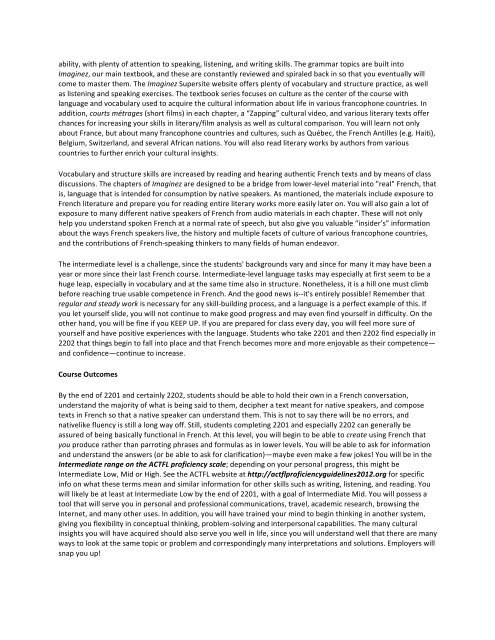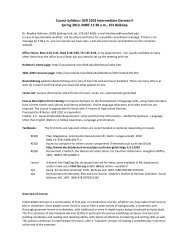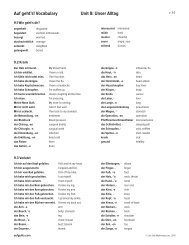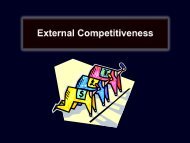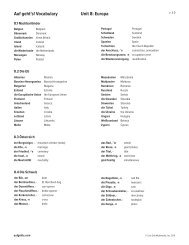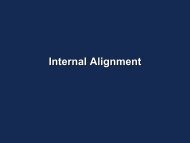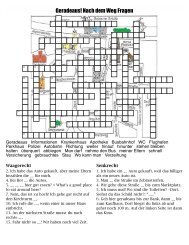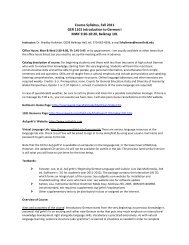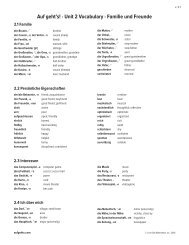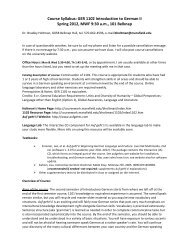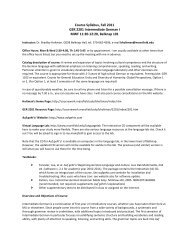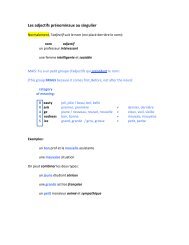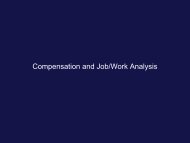Course Syllabus, Fall 2012 FR 2201(W) Intermediate French I MWF ...
Course Syllabus, Fall 2012 FR 2201(W) Intermediate French I MWF ...
Course Syllabus, Fall 2012 FR 2201(W) Intermediate French I MWF ...
- No tags were found...
Create successful ePaper yourself
Turn your PDF publications into a flip-book with our unique Google optimized e-Paper software.
ability, with plenty of attention to speaking, listening, and writing skills. The grammar topics are built into Imaginez, our main textbook, and these are constantly reviewed and spiraled back in so that you eventually will come to master them. The Imaginez Supersite website offers plenty of vocabulary and structure practice, as well as listening and speaking exercises. The textbook series focuses on culture as the center of the course with language and vocabulary used to acquire the cultural information about life in various francophone countries. In addition, courts métrages (short films) in each chapter, a “Zapping” cultural video, and various literary texts offer chances for increasing your skills in literary/film analysis as well as cultural comparison. You will learn not only about France, but about many francophone countries and cultures, such as Québec, the <strong>French</strong> Antilles (e.g. Haiti), Belgium, Switzerland, and several African nations. You will also read literary works by authors from various countries to further enrich your cultural insights. Vocabulary and structure skills are increased by reading and hearing authentic <strong>French</strong> texts and by means of class discussions. The chapters of Imaginez are designed to be a bridge from lower-‐level material into "real" <strong>French</strong>, that is, language that is intended for consumption by native speakers. As mantioned, the materials include exposure to <strong>French</strong> literature and prepare you for reading entire literary works more easily later on. You will also gain a lot of exposure to many different native speakers of <strong>French</strong> from audio materials in each chapter. These will not only help you understand spoken <strong>French</strong> at a normal rate of speech, but also give you valuable “insider’s” information about the ways <strong>French</strong> speakers live, the history and multiple facets of culture of various francophone countries, and the contributions of <strong>French</strong>-‐speaking thinkers to many fields of human endeavor. The intermediate level is a challenge, since the students' backgrounds vary and since for many it may have been a year or more since their last <strong>French</strong> course. <strong>Intermediate</strong>-‐level language tasks may especially at first seem to be a huge leap, especially in vocabulary and at the same time also in structure. Nonetheless, it is a hill one must climb before reaching true usable competence in <strong>French</strong>. And the good news is-‐-‐it's entirely possible! Remember that regular and steady work is necessary for any skill-‐building process, and a language is a perfect example of this. If you let yourself slide, you will not continue to make good progress and may even find yourself in difficulty. On the other hand, you will be fine if you KEEP UP. If you are prepared for class every day, you will feel more sure of yourself and have positive experiences with the language. Students who take <strong>2201</strong> and then 2202 find especially in 2202 that things begin to fall into place and that <strong>French</strong> becomes more and more enjoyable as their competence—and confidence—continue to increase. <strong>Course</strong> Outcomes By the end of <strong>2201</strong> and certainly 2202, students should be able to hold their own in a <strong>French</strong> conversation, understand the majority of what is being said to them, decipher a text meant for native speakers, and compose texts in <strong>French</strong> so that a native speaker can understand them. This is not to say there will be no errors, and nativelike fluency is still a long way off. Still, students completing <strong>2201</strong> and especially 2202 can generally be assured of being basically functional in <strong>French</strong>. At this level, you will begin to be able to create using <strong>French</strong> that you produce rather than parroting phrases and formulas as in lower levels. You will be able to ask for information and understand the answers (or be able to ask for clarification)—maybe even make a few jokes! You will be in the <strong>Intermediate</strong> range on the ACTFL proficiency scale; depending on your personal progress, this might be <strong>Intermediate</strong> Low, Mid or High. See the ACTFL website at http://actflproficiencyguidelines<strong>2012</strong>.org for specific info on what these terms mean and similar information for other skills such as writing, listening, and reading. You will likely be at least at <strong>Intermediate</strong> Low by the end of <strong>2201</strong>, with a goal of <strong>Intermediate</strong> Mid. You will possess a tool that will serve you in personal and professional communications, travel, academic research, browsing the Internet, and many other uses. In addition, you will have trained your mind to begin thinking in another system, giving you flexibility in conceptual thinking, problem-‐solving and interpersonal capabilities. The many cultural insights you will have acquired should also serve you well in life, since you will understand well that there are many ways to look at the same topic or problem and correspondingly many interpretations and solutions. Employers will snap you up!


